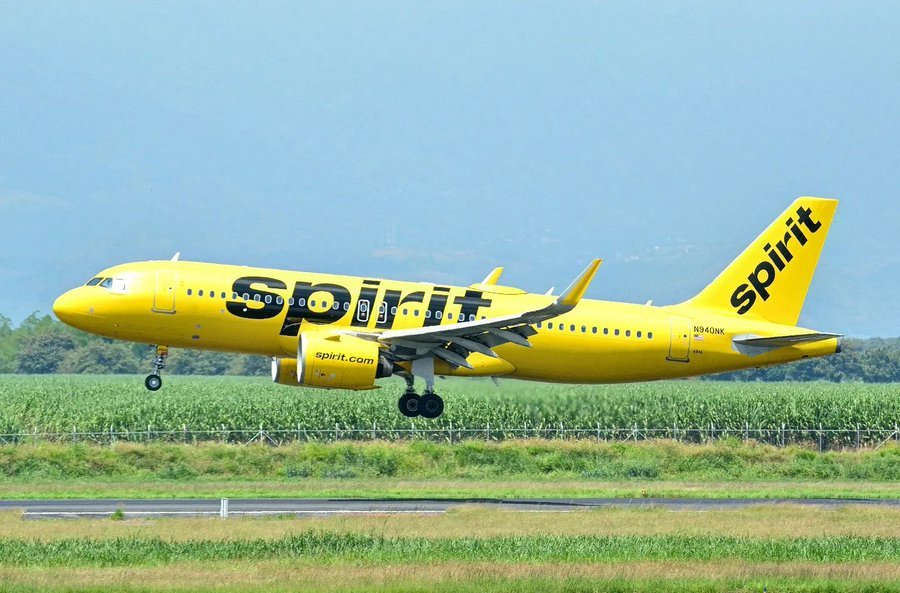A federal judge has blocked JetBlue Airways Corp.’s proposed $3.8 billion merger with Spirit Airlines, citing violation of antitrust laws. The ruling, issued by Judge William G. Young of the U.S. District Court for the District of Massachusetts, states that the merger would have substantially lessened competition and harmed passengers.
The decision comes as a major blow to JetBlue and Spirit, who had hoped to complete the merger by the end of the year. The deal, which was announced in February, would have created the fifth-largest airline in the United States, with a combined fleet of over 450 aircraft and a network of over 1,000 routes.
In his ruling, Judge Young wrote that the merger would have resulted in a significant reduction in competition in the already concentrated airline industry. He noted that the combined airline would have controlled over 13% of the domestic market, giving it the power to set prices and reduce service quality.
“The merger would substantially lessen competition in the airline industry, to the detriment of consumers,” Judge Young wrote. “The evidence shows that the merger would result in higher fares, reduced service, and lower quality of service.”
The ruling was met with cheers from consumer advocates and rival airlines, who had opposed the merger on the grounds that it would reduce competition and lead to higher prices.
“This is a victory for consumers and a blow to the airline industry’s long-standing practice of consolidation,” said Sally Greenberg, executive director of the National Consumers League. “We hope that this decision will send a message to the industry that the days of backroom deals and anti-competitive practices are over.”
JetBlue and Spirit had argued that the merger was necessary to compete with larger airlines and offer lower fares and better service. However, Judge Young found that the airlines had failed to provide sufficient evidence to support their claims.
“The defendants have not met their burden of showing that the merger is necessary to compete effectively in the airline industry,” he wrote. “The evidence shows that the merger is not a necessary response to market conditions, but rather a strategic decision to increase the defendants’ market power.”
The ruling is a significant setback for JetBlue and Spirit, who had been counting on the merger to boost their growth and profitability. The airlines had planned to use the combined carrier to compete with larger airlines such as American Airlines, Delta Air Lines, and United Airlines.
Is Jetblue buying spirit?
No, JetBlue is not buying Spirit Airlines. In February 2022, a federal judge blocked JetBlue’s proposed merger with Spirit Airlines, citing antitrust concerns. The merger would have created the fifth-largest airline in the United States and potentially reduced competition in the market.
JetBlue and Spirit had announced their plans to merge in July 2020, with the goal of creating a more competitive low-cost carrier with a larger route network and a stronger presence in the market. However, the deal faced opposition from regulators and rival airlines, who argued that it would reduce competition and lead to higher prices for consumers.
After the judge’s ruling, JetBlue stated that it would not appeal the decision and would instead focus on growing its business organically. Spirit Airlines also announced that it would continue to operate as a standalone carrier and explore other strategic options.
What next for JetBlue?
JetBlue’s future is uncertain after the federal judge blocked its proposed merger with Spirit Airlines. The airline will likely reassess its growth strategy and explore other options to boost its competitiveness in the highly competitive airline industry. Here are some possible next steps for JetBlue:
1. Re-evaluate growth strategy: JetBlue will need to re-evaluate its growth strategy and explore other options to boost its competitiveness. It may consider expanding its route network, improving its in-flight offerings, or exploring new markets.
2. Seek appeal: JetBlue may appeal the court’s decision to a higher court, hoping to overturn the ruling. However, this process could be lengthy and costly, and there is no guarantee of success.
3. Merge with another airline: JetBlue may consider merging with another airline to create a stronger competitor in the market. Potential partners could include other low-cost carriers such as Frontier Airlines or Southwest Airlines.
4. Focus on core markets: JetBlue may focus on its core markets in the Northeast, Florida, and the Caribbean, where it has a strong presence and brand recognition. It may also look to expand its presence in these markets through increased frequency or new routes.
5. Invest in technology: JetBlue may invest in new technology to improve its operations and customer experience. This could include investing in new aircraft, upgrading its in-flight entertainment systems, or implementing new digital platforms to improve customer service.
6. Focus on customer experience: JetBlue has built its reputation on providing a high-quality customer experience, and it may focus on enhancing this aspect of its business. This could include improving its in-flight offerings, expanding its loyalty program, or offering more personalized services.
Overall, JetBlue will need to adapt to the changing market conditions and find new ways to compete in the airline industry. The airline’s future will depend on its ability to innovate, invest in new technologies, and provide a high-quality customer experience.

